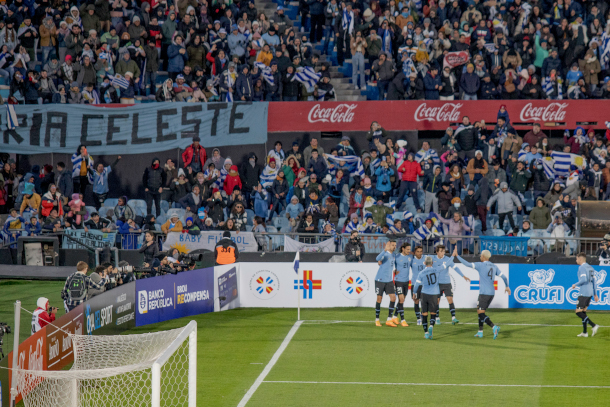The Climate Loses at the World Cup
Air Date: Week of December 16, 2022

A close-up of the FIFA World Cup trophy. UC Boulder’s Roger Pielke estimates global sport’s environmental impact is roughly equivalent to 6 minutes of China’s annual carbon emissions. (Photo: Rhett Lewis on Unsplash)
Despite Qatar’s claim that the 2022 World Cup is carbon neutral, environmentalists are raising concerns about the impact the event is having on both the country and the planet. Although international sports produce far less emissions than top polluting countries, there’s still room for improvement. Brian McCullough, an associate professor at Texas A&M university and co-director of the Sports Ecology Group, joins Host Steve Curwood to explain.
Transcript
BASCOMB: It’s Living on Earth, I’m Bobby Bascomb
CURWOOD: And I’m Steve Curwood
This year’s World Cup in Qatar has been a thrilling ride both on and off the pitch. The soccer competition has been surrounded by controversies, including FIFA’s choice of Qatar as the host which employed modern slavery to build cities and stadia for the matches. This year’s global soccer event has also been criticized for its toll on the environment including the carbon emissions for travel and the tremendous amount of energy used to cool outdoor venues in 120 degree heat. Despite protests, FIFA and Qatar are claiming this World Cup is carbon neutral. Brian McCullough is an associate professor at Texas A&M University and co-director of the Sport Ecology Group. He says the carbon emissions numbers from the Qatar games suggest this might be the most carbon intensive World Cup ever held.
MCCULLOUGH: Well, you know, as there's been a lot of reports coming out that are highly critical of the environmental impact, saying that it's never been higher. Right now, it is quite concerning, again, with the numbers being so much higher than in previous years, including the Russian World Cup and whatnot before. Something I just read this morning was, you know, equating the carbon footprint, about 51% of that carbon footprint was coming from fan travel. The construction of facilities is also a major contributing factor to the overall footprint of the games. In some regards, you can see other contexts that Qatar is obviously a very wealthy nation from its oil exports, and its natural resources there of again, predominantly oil. And so you know, the country requires a lot of importing of different raw materials for construction. And then, of course, being in a relatively remote area of the world, transportation is going to be quite exorbitant. And we see that again, with that 51% of the overall carbon footprint of the event or the estimates for the event itself.
CURWOOD: Brian, compare for me, the carbon emissions from international sporting events, like the World Cup, compare those to emissions from other sectors, or even entire nations.

An aerial shot of the city of Doha in Qatar, where 6 of the 8 stadiums used in the World Cup are located. Qatar has come under scrutiny for using carbon offsets to claim the event is carbon neutral. (Photo: Radoslaw Prekurat on Unsplash)
MCCULLOUGH: There's a great researcher at University of Colorado in Boulder, Roger Pielke, he delivered a speech at an academic conference in Europe this past summer, and put that global sport environmental impact into context where he was saying that the calculations that have been used in popular press and amongst different people in the space, that that would equate to about six minutes of China's annual carbon emissions. Now, granted China's largest carbon emitting country in the world, but still kind of puts that into perspective of where sport lies. And granted, sport needs to clean up its act, especially mega events like this, we need to be more conscious of the environmental impacts and reduce that as best and as most as we can. But I think the challenge I think with specifically with this World Cup, is that they're claiming carbon neutrality through offsetting programs. And there's some criticisms about the carbon offsetting programs that they chose. And then there's other aspects to about, you know, can you really claim carbon neutrality, when you're maybe over reliant on carbon offsets themselves.
CURWOOD: Doesn't sound like you're very confident of their statement that they will be carbon neutral using carbon offsets.
MCCULLOUGH: Right. And, you know, there's different guidelines on greenhouse gas emissions and striving for being carbon neutral. And there's these guidelines would point to that you really cannot rely on carbon offsets to achieve carbon neutrality. And so I think it would be far fetched for any event to claim that they are carbon neutral, especially when you consider how some of these carbon offset programs work, that, in essence, it takes several years to gather the carbon out of the atmosphere, through whether it's tree planting or whatnot. But in essence, if it takes 5, 10, 15, 30 years to draw that carbon out of the atmosphere, you know, 30 years down the road, you're saying, Oh, now we've offset what our impact was 31 years ago for this specific event. So I'm always wary when someone or an event makes that claim. And there's even been some recommendations by consultants within this, well-known consultants in the space, to avoid making such claims as that because there's not even an agreed upon methodology on how to calculate it. And so that could be almost comparing apples to oranges across events with regards to the environmental impact assessments.

Fans cheer on the Republic of Korea soccer team during the Korea vs. Uruguay match while watching from Seoul. Fans can reduce their climate impact by being mindful of what they buy and how they get around in the cities they visit, McCullough says. (Photo: Courtesy of Jeon Han, Korean Culture and Information Service, Flickr, CC BY-SA 2.0)
CURWOOD: Now, the World Cup as well as other sporting competitions, is really huge, right? People come from all over the world. And that travel seems to, as you say, be the bulk of the carbon emissions, or certainly a plurality of the carbon emissions involved. So for fans of these types of sporting events, what can they do to reduce their own environmental impact?
MCCULLOUGH: We've been able to participate in a couple of research studies, and one being the USA Special Olympic Games in Seattle, and what the event planners there did was make sure that they were designing and choosing facilities that were on public transportation routes, and that greatly reduced the environmental impact. And they designed campaigns to educate people that were coming to Seattle, perhaps for the first time and educating them again, how accessible the venues were, the hotels were still on the transportation lines. So there's a lot of planning that can go into this context. Now, that's a much smaller of event, but still had 10s of 1,000s of people attending that, both for volunteers, participants, and spectators. Ultimately, you can kind of create those campaigns, and you have to educate fans. Because if I'm traveling somewhere that I might not know, I'm not really sure if I need to rent a car or not, especially if it's maybe here in the United States, whereas Europe has better public transportation or, you know, not knowing Doha, how well I can get around. But ultimately, what fans can do is try to educate themselves and see what options there are when they're going to a mega sporting event, whether it's, you know, let's say you're flying out to Arizona this year for the Super Bowl. It's, you know, understanding "How can I get from the airport in Phoenix to my hotel, and then from my hotel to the venue itself, using either mass transit or reduced emissions transportation," because that's going to be the biggest thing. The other thing also too, is just, you know, looking to see, minimize your consumption. You know, it's trying to go about and being wise with our spending, because that spending also has, you know, environmental impact, whether it's buying apparel, whether it's at home, or it's on site. But also, you know, looking at all the things that we're buying from food and you know, our rental car, or whatever it might be. So it's just trying to reduce those aspects as best as we possibly can. And I mean, in a lot of ways traveled frugally, but also that frugality will help reduce your environmental impact as well.

The Uruguay National Football Team celebrates during their match against Panama. It is estimated that just over half of the 2022 World Cup’s carbon footprint comes from fan travel. (Photo: Jimmy Baikovicius, Flickr, CC BY-SA 2.0)
CURWOOD: Be stingy for the environment?
MCCULLOUGH: Oh, maybe that's my mentality too much.
CURWOOD: Now, the next World Cup will be jointly hosted by the United States, Canada and Mexico. So what lessons from Qatar's World Cup can the North American hosts learn to reduce the environmental impact of this mega event?
MCCULLOUGH: Yeah, and there's different circles that argue that because the locations are so much further apart, those individual cities can absorb the environmental impact better than having it concentrated in one specific region like this World Cup. But ultimately, the lessons that are going to be learned, hopefully, will be around scheduling. But the context are so different, again, specifically, because the locations are so much further apart. But also, you know, kind of, contrary to the one thinking that if we have it more spread out, it'll be able to absorb this impact more, there's also kind of circles that are debating whether or not there will be increased travel between cities as people come to North America and travel between different sites to watch many games because a lot of people have complimented in a positive way that all the games are right there so that they've been able to see more matches and seeing different groups play than if they were in a format that we're going to be seeing in 2026 and Canada, United States and Mexico.
CURWOOD: Brian McCulloch is an associate professor at Texas A&M University and co-director of the sport ecology group. Thanks so much for taking the time with us today.
MCCULLOUGH: Thank you.
Links
Read more about the Sports Ecology Group’s work here
Grist | “Lessons from the World Cup: How A Changing Climate Is Changing Sports”
Le Monde | “World Cup 2022: The ‘Mirage’ Of Carbon Offsetting”
Living on Earth wants to hear from you!
Living on Earth
62 Calef Highway, Suite 212
Lee, NH 03861
Telephone: 617-287-4121
E-mail: comments@loe.org
Newsletter [Click here]
Donate to Living on Earth!
Living on Earth is an independent media program and relies entirely on contributions from listeners and institutions supporting public service. Please donate now to preserve an independent environmental voice.
NewsletterLiving on Earth offers a weekly delivery of the show's rundown to your mailbox. Sign up for our newsletter today!
 Sailors For The Sea: Be the change you want to sea.
Sailors For The Sea: Be the change you want to sea.
 The Grantham Foundation for the Protection of the Environment: Committed to protecting and improving the health of the global environment.
The Grantham Foundation for the Protection of the Environment: Committed to protecting and improving the health of the global environment.
 Contribute to Living on Earth and receive, as our gift to you, an archival print of one of Mark Seth Lender's extraordinary wildlife photographs. Follow the link to see Mark's current collection of photographs.
Contribute to Living on Earth and receive, as our gift to you, an archival print of one of Mark Seth Lender's extraordinary wildlife photographs. Follow the link to see Mark's current collection of photographs.
 Buy a signed copy of Mark Seth Lender's book Smeagull the Seagull & support Living on Earth
Buy a signed copy of Mark Seth Lender's book Smeagull the Seagull & support Living on Earth

